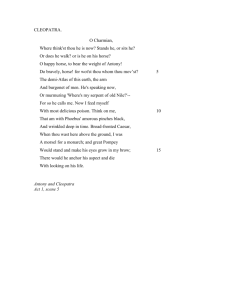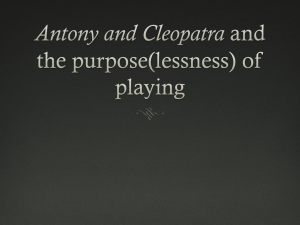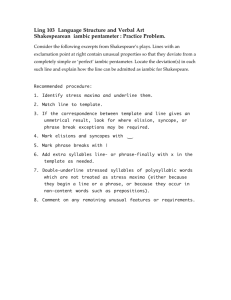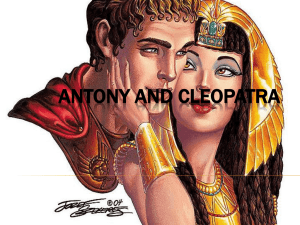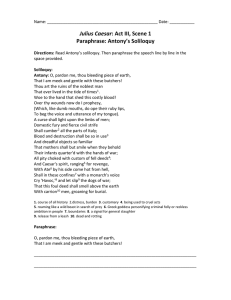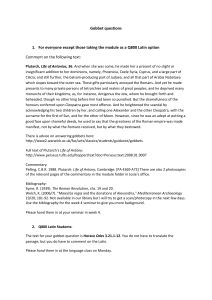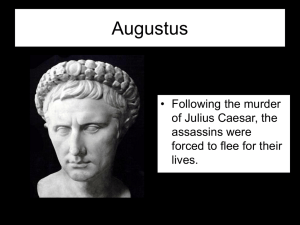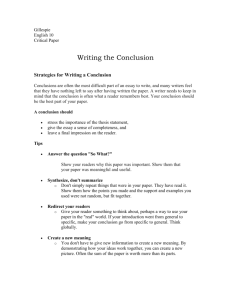Antony and Cleopatra - or
advertisement
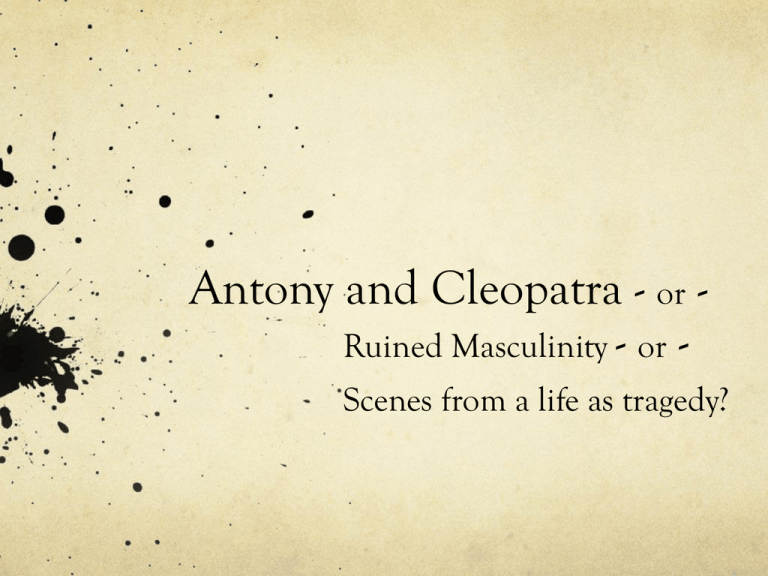
Antony and Cleopatra - or Ruined Masculinity - or Scenes from a life as tragedy? Romeo: O, sweet Juliet! Thy beauty hath made me effeminate, And in my temper soften’d valour’s steel! (3.1.121) Coriolanus: O, mother, mother, What have you done? O my mother! mother! O! You have won a happy victory to Rome…all the swords In Italy, and her confederate arms, Could not have made this peace. (5.3.182-3, 185-6, 207-9) Troilus: Call here my varlet, I’ll unarm again: Why should I war without the walls of Troy, That find such cruel battle here within? Each Trojan that is master of his heart, Let him to the field; Troilus, alas! Has none (1.1.1-5) Antony: O! thy vile lady, She has robb’d me of my sword. (4.12.23-4) Isabella (petitioning forgiveness for Angelo): I partly think A due sincerity govern’d his deeds, Till he did look on me. (5.446-8) Philo: [to Demetrius]Nay, but this dotage of our general’s O’erflows the measure; those his goodly eyes That o’er the files and musters of the wars Have glow’d like plated Mars, now bend, now turn The office and devotion of their view Upon a tawny front: his captain’s heart, Which in the scuffles of great fights hath burst The buckles on his breast, reneges all temper, And is become the bellows and the fan To cool a gipsy’s lust. Look! Where they come. Flourish. Enter Antony, Cleopatra, her Ladies the Train, with Eunuchs fanning her. Take but good note, and you shall see in him The triple pillar of the world transform’d Into a strumpet’s fool; behold and see. Cleopatra: If it be love indeed, tell me how much. Antony: There’s beggary in the love that can be reckon’d. Cleopatra: I’ll set a bourne how far to be beloved. Antony: Then must thou needs find out new heaven, new earth. [Enter a Messenger] Octavius Caesar: Antony, Leave thy lascivious wassails! When thou once Was beaten from Modena, where thou slew’st Hirtius and Pansa, consuls, at thy heel Did famine follow, whom thou fought’st against, Thou daintily brought up, with patience more Than savages could suffer. Thou didst drink The stale of horses and the gilded puddle Which beasts would cough at. Thy palate then did deign The roughest berry on the rudest hedge. Yea, like the stag when snow the pasture sheets, The barks of trees thou browsed. On the Alps, It is reported, thou didst eat strange flesh Which some did die to look on. And all this – It wounds thine honour that I speak it now – Was borne so like a soldier that thy cheek So much as lanked not. (1.5.56-72) Pompey: Mark Antony In Egypt sits at dinner, and will make No wars without doors…all the charms of love, Salt Cleopatra, soften thy waned lip! Let witchcraft join with beauty, lust with both; Tie up the libertine in a field of feasts; Keep his brain fuming. Epicurean cooks Sharpen with cloyless sauce his appetite That sleep and feeding may prorogue his honour Even in a Lethe’d dullness … (2.1.11-13, 20-27) From North’s Plutarch, 1579 …he had a noble presence, and shewed a countenaunce of one of a noble house: he had a goodly thicke beard, a broad forehead, crooke nosed, and there appeared such a manly looke in his countenaunce, as is commonly seene in Hercules pictures, stamped or graven in mettell. Now it had been a speeche of old time, that the familie of the Antonii were discended from one Anton, the sonne of Hercules, whereof the familie tooke name. This opinion did Antonius seeke to confirme in all his doings: not onely resembling him in the likenes of his bodye …. But also in the wearing of his garments. For when he would openly shewe him selfe abroad before many people, he would alwayes weare his cassocke gyrt downe lowe upon his hippes, with a great sword hanging by his side, and upon that, some ill favored cloke. Furthermore, things that seeme intollerable in other men, as to boast commonly, to jeast with one or other, to drinke like a good fellow with everybody, to sit with the souldiers when they dine, and to eate and drinke with them souldierlike: it is incredible what wonderfull love it wanne him amongest them. And … being given to love: that made him the more desired, and … brought many to love him… Besides … his liberalitie … great credit … his authoritie and power also very great, the which notwithstanding him selfe did overthrowe by a thowsand other faults he had. [Enter a Company of Soldiers] 1st Soldier: Brother, good night: to-morrow is the day. 2nd Soldier: It will determine one way: fare you well … [Music of the hautboys is under the stage 2nd Soldier: Peace, what noise? 1st Soldier: List, list! 2nd Soldier: Hark! 1st Soldier: Music i’the air. 3rd Soldier: Under the earth. 4th Soldier: It signs well, does it not? 3rd Soldier: No. 1st Soldier: Peace, I say. What should this mean? 2nd Soldier: Tis the god Hercules, whom Antony lov’d, Now leaves him. 4.3.1-16 [M]asculinity is something quite different from biological maleness, and … different cultures define masculinity in markedly different ways …. What remains constant across these differences, however, is the fact that masculinity must be achieved. It is not a natural given, something that comes with possession of male sexual organs, but an achievement, something that must be worked toward and maintained. Masculinity … is not an essence but a construction (Bruce Smith, Shakespeare and Masculinity (CUP, 2000), p. 2). The Farnese Heracles Among most of the peoples that anthropologists are familiar with, true manhood is a precious and elusive status beyond mere maleness, a hortatory image that men and boys aspire to and that their culture demands of them as a measure of belonging …. Its vindication is doubtful, resting in rigid codes of decisive action in many spheres of life: as husband, father, lover, provider, warrior. A restricted status, there are always men who fail the test. (David Gilmore, Manhood in the Making: Cultural Conceptions of Masculinity [1990, p. 17]). ‘[She] married with mine uncle / My father’s brother, but no more like my father than I to Hercules’ (Hamlet, 1.2.151-53). The ‘scarce-bearded Caesar’ who ‘at Phillippi kept / His sword e’en like a dancer, while I struck /The lean and winkled Cassius… He alone Dealt on lieutenantry, and no practice had / in the brave squares of war’; the ‘novice’ The Farnese Heracles (1592) engraved by Hendrik Goltzius ‘If masculine identity is something that men give each other, they do so under a complicated system of rules whereby they alternately abet and oppose each other’ (Smith, Masculinity, p. 66). If masculinity is something men ‘give each other’, logically, then, it is something that men can take from each other. It is not just winnable but lose-able, not just achievable but reversible. A man can be emasculated. He can be ‘boyed’ – or worse, ‘girled’. Cleopatra: Why should not we Be there [in these wars] in person? Enobarbus: … Your presence needs must puzzle Antony, Take from his heart, take from his brain, from’s time What should not then be spared. He is already Traduced for levity; and ’tis said in Rome that Photinus, an eunuch, and your maids Manage the war. (3.7.5-15) Canidius: …our leader’s led, And we are women’s men. (3.7.68-69) Omphale with cross-dressed Heracles: ‘the noble ruin of her magic’ Antony: Let Rome in Tiber melt, and the wide arch Of the ranged empire fall! Here is my space! Kingdoms are clay! … The nobleness of life Is to do thus. Cleopatra: Excellent falsehood! Why did he marry Fulvia and not love her? I’ll seem the fool I am not. Antony Will be himself. (1.1.34-38; 41-44) Antony and Cleopatra in its own time: March 1603 – September 1604. London playhouses ordered closed by Privy Council, first in response to death of Elizabeth. Then, after arrival of James in London, in response to worst outbreak of plague since 1593. In a single year, 40,000 Londoners die (of a population of ca. 200,000). Shakespeare perhaps writes no new play for a year. Accession of James I, Shakespeare’s company, the Chamberlain’s servants, taken into royal patronage, become the King’s Men. James orders his coronation medal struck: James I CAESAR AUGUSTUS OF BRITAIN: CAESAR THE HEIR OF THE CAESARS King’s Men appear at Court for revels season 1604: they perform two new plays, (which would have had their first performances at the Globe in September/October), Othello (on November 1) and Measure for Measure, along with five other ‘old’ Shakespeare plays (and further plays from the company’s repertoire) . On Twelfth Night (January 6, 1605), Queen Anna and her women perform a masque of her devising, written to her specifications by Ben Jonson, designed by Inigo Jones, the Masque of Blackness. 1605. Year of the Gunpowder Plot (November). Shakespeare writes (we think) Antony and Cleopatra, King Lear, Macbeth (citing ‘equivocation’). A&C: a sequel to Julius Caesar, mopping up after Phillippi. Triumvir + division of the empire. Plutarch as source. Map of the world. A play of 43 scenes, some only four lines long. (Shakespeare ‘invents’ the cinematic cross-cut). No soliloquies (except 1.2.129-137?). 3 central (mythic) parts, in all but 8 scenes totalling 265 lines. 30-odd named supporting roles who ‘earn a place i’th’story’. Six ‘big’ deaths from 4.9 onwards. Act 5 = never takes the focus off Cleopatra. A play built, dramaturgically, on oxymoron, on that which ‘approves the common liar’ and, scenically, on double vision. Key word: ‘become’ and its cognates (‘fie, wrangling queen, whom everything becomes’; ‘for vilest things become themselves in her’; ‘Look…how this Herculean Roman does become the carriage of his chafe’: a play ‘about’ ‘becomings’, transformations, performance/performances. A play that justifies oxymoron. Romeo and Juliet Pyramus and Thisby Troilus and Cressida Antony and Cleopatra Philo: Nay, but this dotage of our general’s O’erflows the measure; those his goodly eyes That o’er the files and musters of the wars Have glow’d like plated Mars, now bend, now turn The office and devotion of their view Upon a tawny front: his captain’s heart, Which in the scuffles of great fights hath burst The buckles on his breast, reneges all temper, And is become the bellows and the fan To cool a gipsy’s lust. Look! Where they come. [Flourish. Enter Antony, Cleopatra, her Ladies, the Train, with Eunuchs fanning her.] Take but good note, and you shall see in him The triple pillar of the world transform’d Into a strumpet’s fool; behold and see. For ‘looking double’ compare 2.2: ‘Welcome to Rome’; exit triumvir; ‘you stayed well by’t in Egypt’; ‘I will tell you…’ 1.1 ‘Alexandrian’ Antony put in view, dedicated to ‘pleasure now’, fobbing off messengers (‘What sport tonight?’) then finally hearing ‘news from Rome’. 1.3 Exits Egypt: provoked by civil wars made by Fulvia, his wife 2.2 In Rome, answers Octavius’s nagging complaints and agrees to a diplomatic marriage with his sister, Octavia, proposed by Agrippa to the fractious triumvirs ‘To hold you in perpetual amity,/ To make you brothers, and to knit your hearts / With an unslipping knot (2.2.132-134). By the end of that scene, Enobarbus is telling Agrippa Antony will ‘Never!’ leave Cleopatra. ‘He will not.’ And in the next scene, bidding Octavia good night after their first ‘betrothal’ meeting, that is, even before the wedding, Antony tells the exiting Soothsayer, ‘I will to Egypt. / And though I make this marriage for my peace/ I’th’East my pleasure lies’ (2.3. 37-39). 2.6 Antony + Octavius meet Pompey – who agrees to their terms. Instead of war, they fall to a feasting on Pompey’s galley: ‘Alexandrian’ Antony seen in action getting riotously drunk and dancing the Egyptian bacchanals; po-faced Octavius resisting revelry. A scene that shows everyone’s fascination with Cleopatra – proxied here in her avatar, the ‘strange serpent’, the crocodile. 3.2 Hangovers + farewells. 3.4 Cut to Athens: Antony + Octavia ‘at home’, he complaining about Octavius; she requesting leave to return to Rome as ambassador between husband and brother. 3.5 Cut to Alexandria. Antony has returned to Cleopatra. 3.6 Octavius, to whom news of Antony’s ‘affairs’ comes ‘to me on the wind’, receives his ‘wronged’ sister and vows revenge. War. 3.7 Prep for the battle of Actium. Cleopatra insists that, ‘as the president of my kingdom’, she will ‘Appear there for a man’. She agrees with Antony that they fight ‘By sea – what else?’ even though Enobarbus (‘Your ships are not well manned, / Your mariners are muleteers’, ‘you therein throw away /The absolute soldiership you have by land’) and his troops (‘O noble Emperor, do not fight by sea’) desperately try to disuade him. They conclude: ‘our leader’s led, / And we are women’s men.’ As feared, the battle is a disaster. It’s staged as ‘noises off’: spectators see Enobarbus and Scarus viewing the rout, the entire Egyptian navy – ‘all their sixty’ – ‘fly[ing] and turn[ing] the rudder’. What happened? ‘Yon ribaudred nag of Egypt’ ‘in the midst o’th’fight’ ‘like a cow in June’ ‘Hoists sails and flies’ – and ‘The noble ruin of her magic, Antony’, ‘like a doting mallard’ ‘flies after her’: says Scarus, ‘I never saw an action of such shame. / Experience, manhood, honour, ne’er before/ Did violate so itself’ (3.10). 3.11 After the battle. Antony: ‘I have lost my way forever’. He bids his followers take a ship laden with gold and fly for ‘I have lost command’. So begins the falling away of men. But when Cleopatra appears and answers his reproof, ‘Egypt, thou knewst too well My heart was to thy rudder tied’; ‘You did know / How much you were my conqueror’ with ‘Pardon, pardon!’, Antony capitulates, ‘Fall not a tear, I say; one of them rates / All that is won a lost. Give me a kiss. / Even this repays me.’ Magnificence? Or folly on a cosmic scale? ‘A diminution in our captain’s brain restores his heart’? Reciprocal embassy: 3.12 Antony’s Schoolmaster (‘I was of late as petty to his ends / As is the morn-dew on the myrtle leaf to his grand sea’); 3.13 Thidias (instructed by Octavius ‘From Antony win Cleopatra; promise, and in our name, what she requires; add more. From thine invention, offers. Women are not … strong’. Antony walks into the scene where it looks like Cleopatra is packing cards with Octavius to betray Antony into his hands: Moon and stars ! Whip him! Were’t twenty of the greatest tributaries , That do acknowledge Caesar, should I find them So saucy with the hand of she here – what’s her name Since she was Cleopatra? … You were half blasted ere I knew you. Ha? Have I my pillow left unpressed in Rome, Forborne the getting of a lawful race, And by a gem of women, to be abused By one that looks on feeders? You have been a boggler ever. But when we in our viciousness grow hard – Oh, misery on’t – the wise gods seel our eyes, In our own filth drop our clear judgements, make us Adore our errors, laugh at’s while we strut To our confusion. I found you as a morsel, cold upon Dead Caesar’s trencher – nay, you were a fragment Of Gnaeus Pompey’s, besides what hotter hours, Unregistered in vulgar fame, you have Luxuriously picked out. For I am sure, Though you can guess what temperance should be You know not what it is. 3.13.100-127 ‘Look … How this Herculean Roman does become The carriage of his chafe’ (1.3.84-86) ‘Authority melts from me… I am satisfied’ (3.13.94, 172) ‘Caesar sets down in Alexandria, where I will oppose his fate… I and my sword will earn our chronicle’ (3.13.173-4, 180) [the resolute soldier] ‘He will not fight with me, Domitius?... Call forth my household servants…Give me thy hand. Thou has been rightly honest; so hast thou…’ (4.2.1,8,10-11) [the maudlin defeatist] 4.3.’Tis the god Hercules whom Antony loved / Now leaves him’ [Antony abandoned – by men & gods] 4.4 ‘Eros! Mine armour, Eros! [to Cleopatra] Ah, let be, let be! Thou art / The armourer of my heart. False! False! This! This!...’ [the domestic Antony, Venus arming Mars] 4.8 ‘We have beat them to their beds.’ [the victorious warrior: Antony ‘himself’] 4.12 ‘All is lost! This foul Egyptian hath betrayed me. My fleet hath yielded to the foe…Triple-turned whore! ’Tis thou Hast sold me to this novice, and my heart Makes only wars on thee! … Betrayed I am. this false soul of Egypt! … [this ] right gipsy hath at fast and loose Beguiled me to the very heart of loss. [to Cleopara] Ah, thou spell! Avaunt! Vanish! … Let [Caesar] take thee And hoist thee up to the shouting plebeians… The witch shall die’ [Antony enraged as mad Hercules] 4.14. Antony: Eros, thou yet behold’st me? Eros: Ay, noble lord. Antony: Sometime we see a cloud that’s dragonish, A vapour sometime like a bear or lion, A towered citadel, a pendent rock, A forked mountain, or blue promontory With trees upon’t that nod unto the world And mock our eyes with air. Thou has seen these signs? They are black vesper’s pageants. Eros: Ay, my lord. Antony: That which is now a horse, even with a thought The rack dislimns and makes it indistinct As water is in water. Eros: It does, my lord. Antony: My good knave Eros, now thy captain is Even such a body. Here I am Antony, Yet cannot hold this visible shape, my knave. I made these wars for Egypt, and the Queen…she, Eros, has Packed cards with Caesar, and false-played my glory Unto the enemy’s triumph. Nay, weep not, gentle Eros. There is left us Ourselves to end ourselves. [masculinity betrayed, pensive Antony, the stoic natural philosopher] Enter Mardian Antony: O thy vile lady! She has robbed me of my sword… She hath betrayed me and shall die the death… Mardian: Death of one person can be paid but once… Antony: Dead then? Mardian: Dead. Antony: Unarm, Eros. The long day’s task is done And we must sleep… Off! Pluck off! The sevenfold shield of Ajax cannot keep The battery from my heart…Apace, Eros, apace! No more a soldier; bruised pieces go… I will o’ertake thee, Cleopatra…I come my queen…stay for me… Come, Eros!... Thou art sworn…when the exigent should come/ Thou then woulst kill me…Do’t.’ Suicide (successful, of Eros). Botched suicide (of Antony): ‘I have done my work ill, friends. O make an end / Of what I have begun’. Enter Diomedes: ‘My mistress Cleopatra sent me to thee. Antony: When did she send thee? Diomedes: Now, my lord… Antony: Bear me, good friends, where Cleopatra bides Tis the last service that I shall command you. ] Cleopatra: O Charmian, I will never go from hence…Is he dead? Diomedes: His death’s upon him, but not dead… Cleopatra: … Antony, Antony! Help, Charmian!, Help, Iras, help! Help, friends below! Let’s draw him hither… Antony: I am dying, Egypt, dying. Only I here importune death awhile until Of many thousand kisses the poor last I lay upon thy lips. Cleopatra: I dare not, dear … Lest I be taken. But come, come Antony – Help me my women, we must draw thee up!... Here’s sport indeed! How heavy weighs my lord!...Yet come a little; … O come, come, come. Antony: I am dying, Egypt, dying. Give me some wine and let me speak a little. Cleopatra: No, let me speak, and let me rail so high That the false huswife fortune break her wheel, Provoked by my offence – Antony: One word, sweet queen … The miserable change now at my end Lament nor sorrow at… [Remember] my former fortunes, Wherein I lived the greatest prince o’th’world, The noblest; [and die] a Roman by a Roman / Valiantly vanquished…I can no more. Cleopatra: Noblest of men, woo’t die? Hast thou no care of me? … O see, my women, The crown o’th’earth doth melt. My lord! (4.15. 1- 65) [Enter Dolabella] Most noble empress, you have heard of me? Cleopatra: I cannot tell. Dollabella: Assuredly you know me. Cleopatra: No matter, sir, what I have heard or known. You laugh when boys or women tell their dreams; Is’t not your trick? [Dolabella: I understand not, madam] Cleopatra: I dreamt there was an emperor Antony. O, such another sleep, that I might see But such another man! [Dolabella: If it might please ye – ] His face was as the heavens, and therein stuck A sun and moon which kept their course and lighted The little O, the earth. [Dolabella: Most sovereign creature – ] His legs bestrid the ocean; his reared arm Crested the world; his voice was propertied As all the tuned spheres, and that to friends; But when he meant to quail and shake the orb, He was as rattling thunder. For his bounty, There was no winter in’t; an autumn it was That grew the more by reaping. His delights Were dolphin-like: they showed his back above The element they lived in. In his livery Walked crowns and crownets; realms and islands were As plates dropped from his pocket. [Dolabella: Cleopatra – ] Think you there was or might be such a man As this I dreamt of? [Dolabella: Gentle madam, no.] You lie, up to the hearing of the gods! But is there be nor ever were one such, It’s past the size of dreaming (5.2.75-97)
